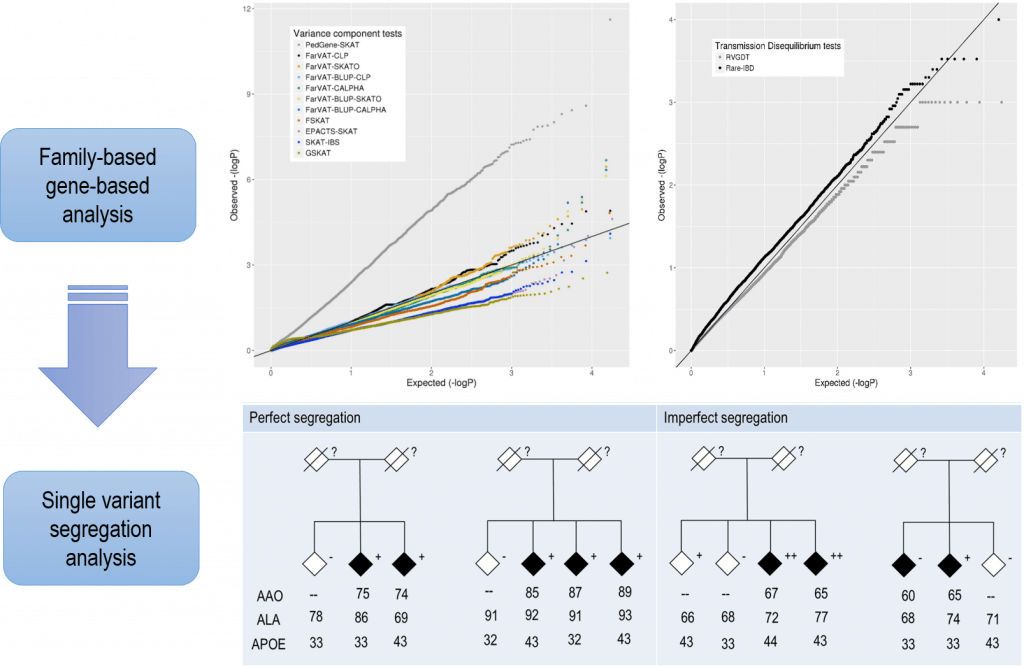Family-based approaches led to the identification of disease-causing Alzheimer’s Disease (AD) variants in the genes encoding amyloid-beta precursor protein (APP), presenilin 1 (PSEN1) and presenilin 2 (PSEN2). Subsequently, the identification of these genes led to the Aβ-cascade hypothesis and recently to the development of drugs that target that pathway. In this proposal, we will identify rare risk and protective alleles. In a recent study, we identified a rare coding variant in TREM2 with large effect size for risk for AD, confirming that rare coding variants play a role in the etiology of AD. We will use sequence data from families densely affected by AD, because we hypothesize that these families are enriched for genetic risk factors. We already have access to sequence data from 695 families (2,462 individuals), that combined with the ADSP data will lead to a very large family-based dataset: more than 805 families and 4,512 participants. Our preliminary results support the flexibility of this approach and strongly suggest that protective and risk variants with large effect size will be found. The identification of those variants and genes will lead to a better understanding of the biology of the disease.

Publications
- Fernández MV, Budde J, Del-Aguila JL, Ibañez L, Deming Y, Harari O, Norton J, Morris JC, Goate AM; NIA-LOAD family study group; NCRAD, Cruchaga C. Evaluation of Gene-Based Family-Based Methods to Detect Novel Genes Associated With Familial Late Onset Alzheimer Disease. Front Neuroscience 2018; 12:209. PMCID: PMC5893779
- Cruchaga C, Del-Aguila JL, Saef B, Black K, Fernandez MV, Budde J, Ibanez L, Kapoor M, Tosto G, Mayeux RP, Holtzman DM, Fagan AM, Morris JC, Bateman RJ, Goate AM; Dominantly Inherited Alzheimer Network (DIAN); Disease Neuroimaging Initiative (ADNI); NIA-LOAD family study, Harari O. Polygenic risk score of sporadic late-onset Alzheimer’s disease reveals a shared architecture with the familial and early-onset forms. Alzheimers Dement 2018; (2):205-214. PMCID:PMC5803427
- Ridge PG, Karch CM, Hsu S, Arano I, Teerlink CC, Ebbert MTW, Gonzalez Murcia JD, Farnham JM, Damato AR, Allen M, Wang X, Harari O, Fernandez VM, Guerreiro R, Bras J, Hardy J, Munger R, Norton M, Sassi C, Singleton A, Younkin SG, Dickson DW, Golde TE, Price ND, Ertekin-Taner N, Cruchaga C, Goate AM, Corcoran C, Tschanz J, Cannon-Albright LA, Kauwe JSK; Alzheimer’s Disease Neuroimaging Initative. Linkage, whole genome sequence, and biological data implicate variants in RAB10 in Alzheimer’s disease resilience. Genome Med. 2017; 9(1):100. PMCID: PMC5706401
- Fernández MV, Kim JH, Budde JP, Black K, Medvedeva A, Saef B, Deming Y, Del-Aguila J, Ibañez L, Dube U, Harari O, Norton J, Chasse R, Morris JC, Goate A; NIA-LOAD family study group; NCRAD, Cruchaga C. Analysis of neurodegenerative Mendelian genes in clinically diagnosed Alzheimer Disease. PLoS Genet. 2017;13(11):e1007045. doi: 0.1371/journal.pgen.1007045. PMCID: PMC5683650
- Wetzel-Smith MK, Hunkapiller J, Bhangale TR, Srinivasan K, Maloney JA, Atwal JK, Sa SM, B Yaylaoglu M, Foreman O, Ortmann W, Rathore N, Hansen DV, Tessier-Lavigne M; Alzheimer’s Disease Genetics Consortium, Mayeux R, Pericak-Vance M, Haines J, Farrer LA, Schellenberg GD, Goate A, Behrens TW, Cruchaga C*, Watts RJ, Graham RR. A rare mutation in UNC5C predisposes to late-onset Alzheimer’s disease and increases neuronal cell death. Nat Med 2014; 20(12): 1452-7. PMCID: PMC4301587
- Lord J, Lu AJ, Cruchaga C. Identification of rare variants in Alzheimer’s disease. Front Genet 2014; 5:369. PMCID: PMC4211559
- Cruchaga C, Karch CM, Jin SC, Benitez BA, Cai Y, Guerreiro R, Harari O, Norton J, Budde J, Bertelsen S, Jeng AT, Cooper B, Skorupa T, Carrell D, , Cairns N, Morris JC, Kauwe JS, Goate AM. Rare coding variants in the phospholipase D3 gene confer risk for Alzheimer’s disease. Nature 2014; 505(7484):550-4. PMCID: PMC4050701
- Benitez BA, Cruchaga C; United States–Spain Parkinson’s Disease Research Group. TREM2 and neurodegenerative disease. N Engl J Med 2013; 369(16):1567-8. PMCID:PMC4380008
- Harms M, Benitez B, Cairns N, Cooper B, Cooper P, Mayo K, Carrell D, Faber K, Williamson J, Bird T, Diaz-Arrastia R, Foroud T.M, Boeve B.F, Graff-Radford N.R, Mayeux R, Chakraverty S, Goate AM., and Cruchaga C, for the NIA-LOAD/NCRAD Family Study Consortium. C9ORF72 hexanucleotide repeat expansions in clinical Alzheimer’s disease. JAMA Neuro 2013; 70(6):736-41. PMCID: PMC3681841